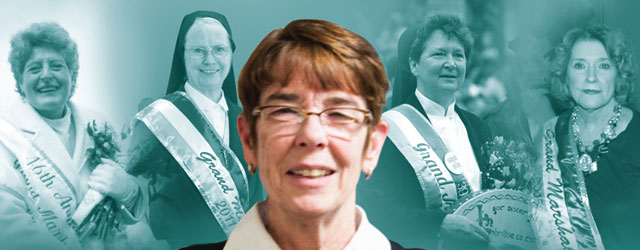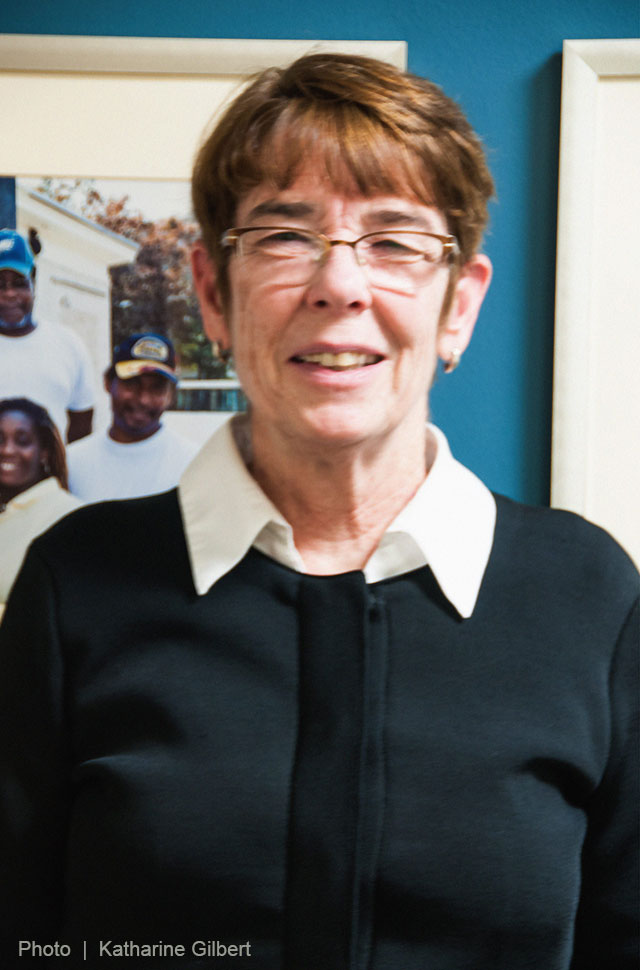By Sabina Clarke
The theme of this year’s St. Patrick’s Day Parade is St. Patrick Bless Those Who Respond to the Call of the Needy and Sister Mary Scullion, R.S.M. the daughter of Irish immigrants lives this call every minute every day.
She is co-founder and executive director of Project HOME begun in 1989, as a single emergency winter shelter. Today it is a $30.5 million multipronged continuum of care, with 800 individual units of housing and one of the most effective homeless organizations in the country.
Among America’s 10 largest cities, Philadelphia has the lowest rate of homelessness — a phenomenon that can be attributed directly to Scullion’s efforts.
She began advocating for the homeless and mentally ill in 1976, working at Mercy Hospice, recalling it as “the most profound experience I ever had of God.” In 1985 she founded Women of Hope which provided permanent residences and support services for homeless mentally ill women, and she lived among them. This was also the year that she spent her yearly retreat on the streets of Philadelphia. For one week, she lived as a homeless person, “I did what homeless people do —sleeping wherever possible, using public restrooms and scrounging for food. I learned firsthand what it is to be homeless. It was a very difficult experience both physically and mentally.”
In 1988, she founded the Outreach Coordination Center the nation’s first program that coordinated city, private and public agencies to assist people living on the streets in a more systematic way.
Mary Scullion believes in the “the dignity of every human being.” She wants us to look at the homeless and say not“There but for the grace of God go I but there go I.” And because of her passion and dedication, she has removed the stigma of the homeless, and instead focused a national spotlight on solving the problem of homelessness and understanding its root causes — a comprehensive study that evolved over the years —. “We learned that shelter wasn’t enough. People need homes, jobs, education, and health care. They need community.”
She is also politically savvy possessing the skills to affect legislation and bring various entities together on the city, state and federal level while attracting major corporate and private donors as partners in her mission to care for the homeless.
Helping the less fortunate came naturally to her. From a young age she was driven by a desire to “help improve the lives of others.” As a student at Little Flower High School, she volunteered at a summer camp for underprivileged children. At sixteen, she announced to her parents that she wanted to enter the convent; they said she was too young to make such a big decision — so she waited until she was 19 and enrolled at St. Joseph’s University graduating with a BA in Psychology and later from Temple University with a Masters in Social Work.
Her mother Sheila Garvin is from Ballina, County Mayo in the West of Ireland; her father Joseph from Magherafelt, County Derry, Northern Ireland. They immigrated to the U.S. in 1953 and settled in the Northeast section of Philadelphia. She has a sister Sheila who is now a nurse living in St. Croix, Virgin Islands.
From an early age she had a strong sense of social justice. Picture a little girl of 10 watching the civil rights demonstrations on TV and being enthralled with the Civil Rights icon Malcolm X for “standing up for what he believed in and speaking out against segregation and racial discrimination.”
At the time of our last conversation in 1993 (Irish Edition.com, March 1993, Mary Scullion: Angel of Mercy, Advocate of the Homeless) Mary Scullion was a local celebrity, recognized with the 1992 Philadelphia Award for her work. She was boldly standing up to Center City real estate developers and city officials who were against granting permits to build housing for the homeless.
She was also getting arrested for feeding the homeless at 30th Street Station – the charge was ‘trespassing’ — and taking over the Federal Building in the eighties when President Reagan made housing cuts and demonstrating — outside Mayor Rendell’s office, when lobbying for a permit to build Project HOME at 1515 Fairmount Avenue. She lead a group of homeless into the Municipal Services Building in the late 1980s in freezing winter demanding that it be used as a temporary shelter for the homeless.
She was arrested four times for her actions on behalf of the homeless and spent hours in jail while forcing those whose eyes, may have been comfortably averted, to look at the homeless and listen to them. She opened our eyes to their plight and told us it didn’t have to be that way. She pricked our collective conscience and took on the city and the state — demanding that they pay attention — and she won.
Today she is a national celebrity even though she would be the last one to acknowledge this. When I tell her that she has now “gone global” as one of Time Magazine’s 100 Most Influential People in the World in 2009 — she laughs. She has always eschewed the spotlight and the notion of celebrity saying, “This is about all of us.” When she started her work she was often compared to Mother Teresa for her dedication to the poor — another comparison she easily shrugs off.
A key moment in her spiritual development was the 41st International Eucharistic Congress held in Philadelphia in 1976. It was there, that she first heard Dorothy Day and Mother Teresa and the Spanish Jesuit Pedro Arrupe speak on the plight of the poor. She remembers the day well, “The atmosphere was electrifying. I was profoundly moved. What an amazing day that was.” It was the words of Pedro Arrupe that made the biggest impression — as she recites them, “If there’s hunger anywhere in the world, the Eucharist is incomplete everywhere in the world.”
Mary Scullion has accrued many awards including several Honorary Doctoral Degrees in Humane Letters from various universities such as Georgetown University in 2017 and in 2013 the James Cardinal Gibbons Award from Catholic University of America and the Laetare Medal from the University of Notre Dame in 2011 — the highest civilian award given to a Catholic. In 2002 she was selected as a USA Eisenhower Fellow and she was the commencement speaker at Georgetown University in 2017.
In her commencement addresses, she urges college graduates to “Change the world and begin a revolution of tenderness.” Her message is well-received, “Young people today are more aware of the need for compassion and justice. They want to live a more just and authentic life. I tell them that through helping and reaching out to others — we will be changed.”
As she has become more well-known for her work, she has been embraced by celebrities like Bon Jovi and Bill Clinton and wealthy donors seek out her company, but it is to the homeless that she feels the deepest personal connection. These are her people.
Recently, Project HOME in cooperation with SEPTA and the City of Philadelphia partnered to open the Hub of Hope in the concourse area of the Municipal Services Building in Philadelphia. It provides meals, clothing, showers, laundry facilities and medical services to the homeless. This is the same building, where in 1988, Mary Scullion led a group of homeless in the freezing winter demanding that the area be used as a temporary shelter for the homeless — now so many years later SEPTA and the City of Philadelphia are joint partners in her vision.
As I saw this event covered by local TV with Mary Scullion excitedly in the center of it — I chuckled — thinking to myself, who else would ever think of utilizing a public space like this! As it turns out my instincts were correct — it is the only space of its kind in the nation.
Another landmark for Project HOME, is the groundbreaking for the Gloria Casarez Residence — the first young-adult LGBTQ friendly permanent supportive housing in the state of Pennsylvania — the result of a joint partnership with the city, state and U.S. Department of Housing and Urban Development. This is something she is very proud of, “There are a growing number of young adults on the street — and 30 to 40 percent of young adults are LGBTQ. They are over-represented in the health care system and over-represented in the homeless population because so many of them are put out of their homes because of their sexual identity. Right now we have 40 units for young adults who are homeless —they are all LGBTQ friendly, but people deal with their sexuality in different ways. Some like to keep their sexual identity private and live in an integrated setting while others want to be more out with their identity in a stand-alone LGBTQ residence — so that is the Gloria Casarez residence.”
My final question is how has working with the homeless changed her? “It has changed me in every way. People who have nothing have taught me so much about courage and compassion and forgiveness. It is the closest experience I can have of touching Christ today. This is the best job.”


